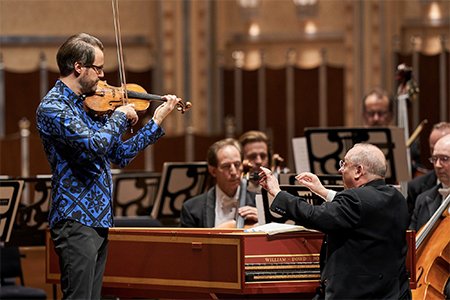by Mike Telin
Although Nic McGegan has led numerous concerts with The Cleveland Orchestra, he has never conducted Apollo’s Fire. That will change this week when he makes his debut with the acclaimed period instrument ensemble in five area performances of Handel’s Messiah.
On Wednesday, December 8 at 7:30 pm at St. Bernard Catholic Church in Akron, McGegan will lead Apollo’s Fire & Apollo’s Singers and soloists Erica Schuller, soprano, Daniel Moody, countertenor, Thomas Cooley, tenor, and Hadleigh Adams, baritone, in Handel’s celebrated oratorio. Performances run through Sunday, December 12. See our Concert Listings page for locations and times. Tickets are available online.
For the next two weeks McGegan’s musical life will be all about Handel’s oratorio. “I’m doing nine in total — five with Apollo’s Fire and then four with the Chicago Symphony,” the affable maestro said during a telephone conversation from St. Louis, where he was conducting concerts with the St. Louis Symphony.
Although he’s not exactly sure how many Messiahs he’s conducted in his career, he estimates it’s between 150 and 200. “I happen to know the first time I conducted it because it was thirty-five years ago this month right here in St. Louis with the St. Louis Symphony. And would you believe it, Lorraine Hunt Lieberson was singing soprano, and she had never sung it either. Since then I think the most I’ve ever done in one year was a dozen. And the only time I haven’t done it was last December. I’m getting to know it now.”
While a performance of the complete work runs a full three hours, the Apollo’s Fire concerts will be slightly shorter in length. “We’re doing a two-and-a-half-hour version which is only sensible — we want people to enjoy it. But it’s all there: the angels, the shepherds, the crucifixion, the Hallelujah Chorus, and the resurrection.”
I asked McGegan about the work’s first scene: Isaiah’s prophecy of salvation. “Something you said I really like — the first scene. That’s because I don’t regard the piece as a string of individual numbers.” He added that the beauty of the oratorio is that it flows so well, one piece inextricably leading to the next.
“The Overture is deliberately putting us in need of comfort — we’re lost in e minor. And it’s the tenor who comes and says you can cheer up now [‘Comfort ye my people’]. Then he tells you what will happen when you cheer up [‘Ev’ry valley shall be exalted’], and the chorus caps that whole theme with ‘And the glory of the Lord,’ which is the second part of the verse of ‘Ev’ry Valley.’ So they go together in the Bible just as they do in the oratorio.”
McGegan said that while Handel’s music is great, the person who doesn’t get enough credit is librettist Charles Jennens. “It’s quite clear from the correspondence between Handel and Jennens that — well, Jennens himself regarded it as his idea to do the piece, but Handel talks constantly about how ‘I’m setting your Messiah to music.’”
The conductor regards Jennens’ ability to create librettos as pure genius, whether it was his own text as in Belshazzar, or a Biblical text as with Messiah, or Milton’s poetry as with L’Allegro. “He just knew how to shape an act and how to make everything flow musically.”
Does McGegan have a favorite part of Messiah? “In terms of just an act, the second [‘Christ’s Passion’] I think is one of Jennens’ great ones. It’s an enormous journey going from ‘Behold of the Lamb of God’ all the way through to the ‘Hallelujah Chorus.’ And Handel, who normally wrote music about real people whether they are Biblical, sacred, secular, or operatic characters, had a great understanding of the human heart. And the way he writes about Christ’s suffering is so beautifully put into the music. Then you have the sheer joy of the ‘Hallelujah Chorus’ at the end.”

McGegan with Peter Otto and The Cleveland Orchestra
McGegan said there are a couple of things to remember about the oratorio: one is that it is designed as an Easter piece, not a Christmas piece. And two, that Handel almost never performed his sacred oratorios in a sacred space.
“Music Hall in Dublin, where the premiere took place, was literally a little concert hall. And the first five or six years that he did it in London, it was almost always at Covent Garden, so you are dealing with theater acoustics.”
McGegan looks forward to conducting the oratorio this coming Easter in Dublin not far from where the first performance took place. “There is a memorial garden where it was premiered, but the store that was there back in Handel’s day, Kennan & Sons, is still there and owned by the same family. What is different is that one house down is now the George Frideric Handel Hotel. I think Handel would be very pleased to have his own hotel. He would go there for a large beer, or three.”
Another thing that Handel never did was to perform the Messiah in large churches with huge choirs. “The tradition of performing the piece in big, boomy churches didn’t come until 1784 with the Handel centenary at Westminster Abbey with a choir of 300. And things only got bigger from there. And the ‘Mega Handel performances,’ which were the norm in the 19th and a great deal of the 20th century with hundreds of people taking part — that is something that Handel never did himself.”
McGegan looks forward to this week’s smaller-scale performances with period instruments. Still, five performances in five venues, four of which are churches, does present an acoustical challenge.
“A church is going to resonate more than a concert hall, so I need to be careful not to take things too fast. I’ve also got to make sure — and this is something I firmly believe — although Handel’s music is wonderful, it’s really all about the words. And if you can’t hear the words, there’s no point in doing it. So I need to be very adaptable.”
McGegan is excited about his Apollo’s Fire debut as well as being back in Cleveland. “It’s going to be great to come to a place I know and love to work with some new people and see many old friends. And once again visit the Cleveland Museum of Art.”
Photos by Steve Sherman, Laura Barisonzi, and Roger Mastroianni.
Published on ClevelandClassical.com December 7, 2021.
Click here for a printable copy of this article





